This is the story of institutional collaboration at its best.
In 2013 Bill Palmer sent through a list of 78 rpm discs held by the National Library of Australia, summarised in their catalog as follows:
“The collection consists of two albums and 20 single sound discs, word lists, slides and photographs. Records include specimens of native languages of the British Solomon Islands Protectorate; speech of Hagen natives; gospel recordings; and titles in Fijian, Babatana, Owa Raha, Bilua, Marovo, Dobu, Ungarinyin, Hula, Tavara, Motu, Johore Malay, Western Sumatra Malay, Wedau and Police Motu. Brief typescript word lists are included with the Motu, Hula, Tavara, Dobu and Babatana sound discs. There is an English-Owa Rahan vocabluary for the Owa Raha disc.”
We sent a request to the NLA with whom PARADISEC has always had a close working relationship. They agreed in principle and then we had periodic contact about this. In July 2015 we approached the National Film and Sound Archive who have the necessary playback equipment. Further to-ing and fro-ing of emails finally resulted in agreement from the NLA in June 2016.
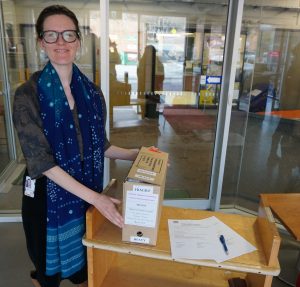
At long last, in July Beth Lonergan (Assistant Curator of digital archives, pictures, and manuscripts at the National Library of Australia) kindly collected all the items so that we could deliver them to the National Film and Sound Archives for digitisation.
Once at the NFSA, Gerry O’Neill (Audio Officer, audio preservation and technical services) was in charge of the cleaning and digitising of the discs.
And in case you are interested, these discs fall into two types, those which are shellac pressings, which once recorded upon, needed further processing and then could be “mass” reproduced, and those which are instantateous, and ready to be listened to without further processing.
And of the instantaneous discs we found, some had aluminium under a coating of acetate, and some had glass! These discs tend to be physically more fragile and contain one-of-a-kind recordings.
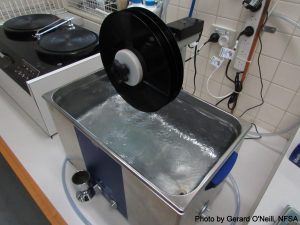
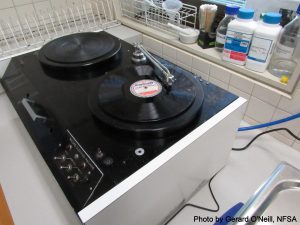
Approximately 50 disks have been digitised, catalogued, and are now archived with PARADISEC. You can can find these and other recordings collected by Arthur Capell here: http://catalog.paradisec.org.au/collections/AC1.
These exciting new additions can be found in the AC1 collection beginning with the item number 500. Here is an excerpt of one of these gems that just happens to have a bit of the text transcribed. The language is Sinaugoro (ISO 639-3 snc), spoken in the Central Province of Papua New Guinea.
If you’d like to listen to the whole recording, here is the direct link (once you are logged in) to item AC1-517 in the PARADISEC catalog: http://catalog.paradisec.org.au/collections/AC1/items/517 (click on the ‘audio’ link at the top).
Enjoy!
Julia Colleen Miller (julia.miller@anu.edu.au)
Senior Data Manager, ARC Centre of Excellence for the Dynamics of Language
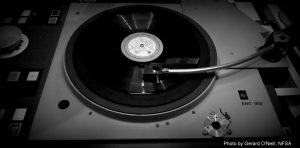
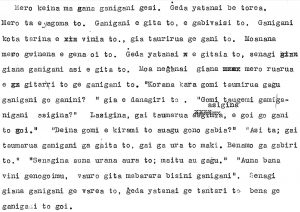
 Follow
Follow
Here at Endangered Languages and Cultures, we fully welcome your opinion, questions and comments on any post, and all posts will have an active comments form. However if you have never commented before, your comment may take some time before it is approved. Subsequent comments from you should appear immediately.
We will not edit any comments unless asked to, or unless there have been html coding errors, broken links, or formatting errors. We still reserve the right to censor any comment that the administrators deem to be unnecessarily derogatory or offensive, libellous or unhelpful, and we have an active spam filter that may reject your comment if it contains too many links or otherwise fits the description of spam. If this happens erroneously, email the author of the post and let them know. And note that given the huge amount of spam that all WordPress blogs receive on a daily basis (hundreds) it is not possible to sift through them all and find the ham.
In addition to the above, we ask that you please observe the Gricean maxims:*Be relevant: That is, stay reasonably on topic.
*Be truthful: This goes without saying; don’t give us any nonsense.
*Be concise: Say as much as you need to without being unnecessarily long-winded.
*Be perspicuous: This last one needs no explanation.
We permit comments and trackbacks on our articles. Anyone may comment. Comments are subject to moderation, filtering, spell checking, editing, and removal without cause or justification.
All comments are reviewed by comment spamming software and by the site administrators and may be removed without cause at any time. All information provided is volunteered by you. Any website address provided in the URL will be linked to from your name, if you wish to include such information. We do not collect and save information provided when commenting such as email address and will not use this information except where indicated. This site and its representatives will not be held responsible for errors in any comment submissions.
Again, we repeat: We reserve all rights of refusal and deletion of any and all comments and trackbacks.